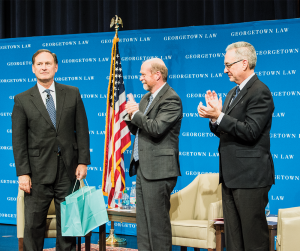
Supreme Court Justice Samuel A. Alito, left, spoke at the Third Annual Dean’s lecture to the graduating class of the Georgetown University Law Center, addressing topics from making an impact in the legal industry to the currently vacant seat on the Supreme Court.
Supreme Court Justice Samuel A. Alito Jr. took center stage at the Third Annual Dean’s Lecture to the graduating class at the Georgetown University Law Center this Tuesday, where he discussed topics ranging from career advice to the vacant Supreme Court seat.
Alito did not address the heated debate among Georgetown law professors and students surrounding late Justice Antonin Scalia’s legacy.
Alito completed his undergraduate degree at Princeton University before attending Yale Law School. GULC Dean William Treanor moderated the conversation.
“I am absolutely delighted that today we will be hearing from Justice Alito. It should be a great treat,” Treanor said in his introduction. “Particularly as a New Jersey native I am delighted that another New Jersey native is joining us.”
GULC constitutional law professor Randy Barnett formally introduced Alito and stressed the event’s importance as a means of providing guidance to the graduating class.
“The purpose of the conversation that you are going to hear today, as it has been in prior years, is to provide the graduating class with guidance from someone who stood where you now sit, and are thinking about how to use his or her own legal education to make a difference,” Barnett said. “As you prepare to embark on your own careers, there could be no better person to share how his values have shaped his own experiences, is today’s honored guest, Justice Samuel Alito.”
Alito emphasized in his remarks the shock that he and the rest of the Supreme Court felt upon learning of Scalia’s Feb. 13 passing. His comments offered the public an early look into the inner workings of the court since Scalia’s death.
“What’s happened in the last week has been a great shock to us,” Alito said. “We just started back in business hearing arguments yesterday. We’ll see what develops.”
With the prospect of an eight-member bench for a contentious Supreme Court term approaching, the justices are set to hear cases on abortion, union rights and affirmative action. Although a four-to-four decision results in automatic deference to the lower court’s decision and does not set legal precedent, Alito noted that the Supreme Court has functioned well in the past with an even number of justices, including during the early 1970s and in the late 1980s. Alito joked that there may even have been less discord within the entity.
“We will deal with it,” Alito said. “There’s nothing in the Constitution that specifies the size of the Supreme Court. There were times in the history of the court when the court had an even number of justices. They must have been more agreeable in those days.”
When asked directly, Alito declined to speculate on who President Barack Obama would nominate to succeed Scalia, instead emphasizing that as a Supreme Court justice, he has enough on his plate that demands his judgment.
“We don’t choose our colleagues. The presidents choose the justices and the judges and the Senate confirms them,” Alito said. “I have enough trouble with the questions that I have to decide.”
Alito also spoke to the graduating class about his experiences throughout law school and early in his legal career, the confirmation process in the U.S. Senate and his nomination to the Supreme Court by President George W. Bush in 2005.
“The one piece of advice that I give to law students or undergraduates that are thinking about going to law school is that they should get to know what lawyers really do,” Alito said.
Other topics brushed on Alito’s self-declared originalist philosophy, an ideology to which Scalia was also famous for adhering.
“I do think the Constitution means something,” Alito said. “I think that meaning does not change. I think it means the same thing now as it did when it was adopted.”
When speaking about his time working for the U.S. Attorney’s Office under Maryanne Trump-Barry, the sister of current presidential candidate Donald Trump, Alito showed off his sense of humor.
“She’s a very good friend,” Alito said. “Whether she’s like her brother or not, I won’t get into.”
Following Alito’s remarks, he answered questions submitted by graduating law students that focused on the relationships between justices and his vision for the nomination of the future Supreme Court justice.
Laya Varansi (LAW ’17) said that she was inspired by Alito’s comments on his legal career, adding that she found them relatable to the concerns of law students who are soon to graduate.
“It was really great to see how his career trajectory took him to where he is. It was inspirational in a lot of ways because I know a lot of students here, we have short-term aspirations, but we don’t necessarily know where it is going to lead us,” Varansi said. “For somebody like him to have such a similar story to how we are feeling — it’s really inspirational, and leads us to believe that we could end up there too.”
Bridget Stubblefield (LAW ’17) echoed Varanisi’s sentiments.
“It’s always such an honor to hear any of the justices come and talk to us in such a personal space,” Stubblefield said.




















